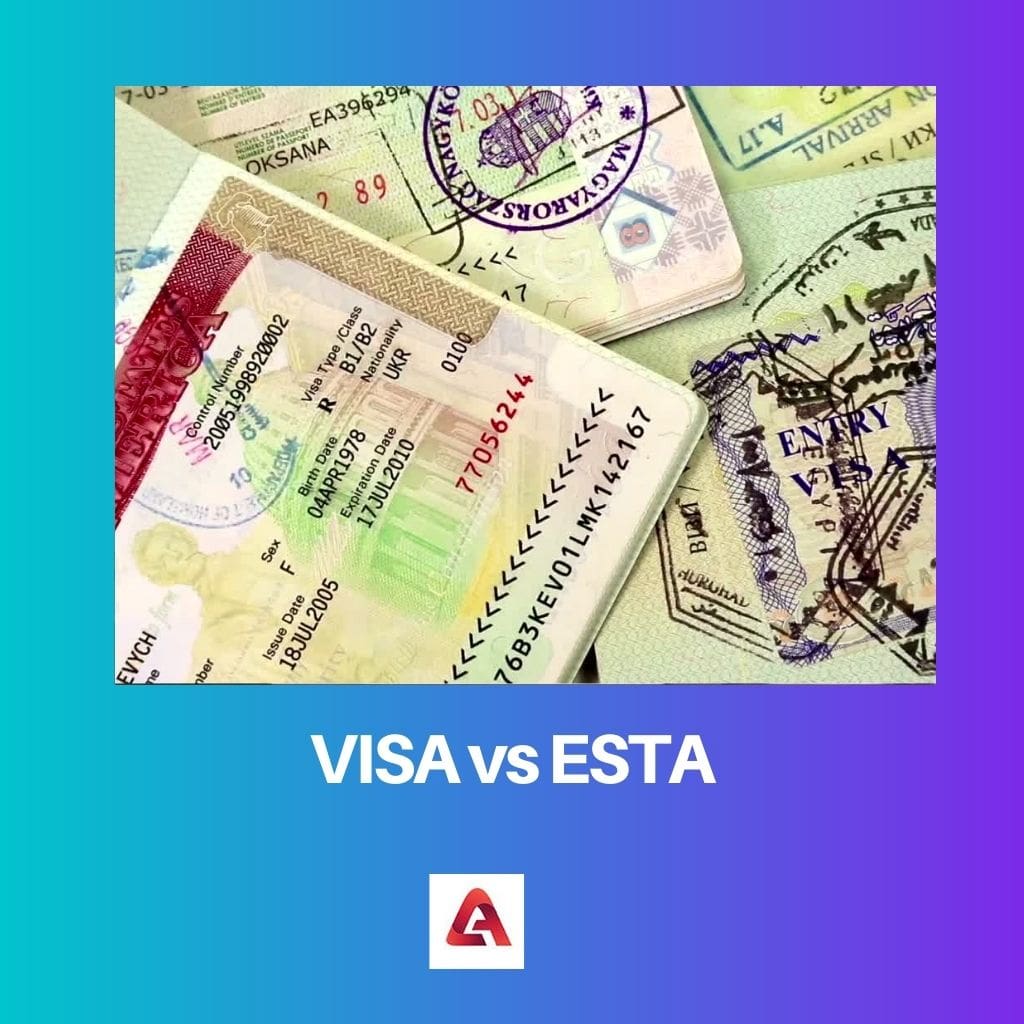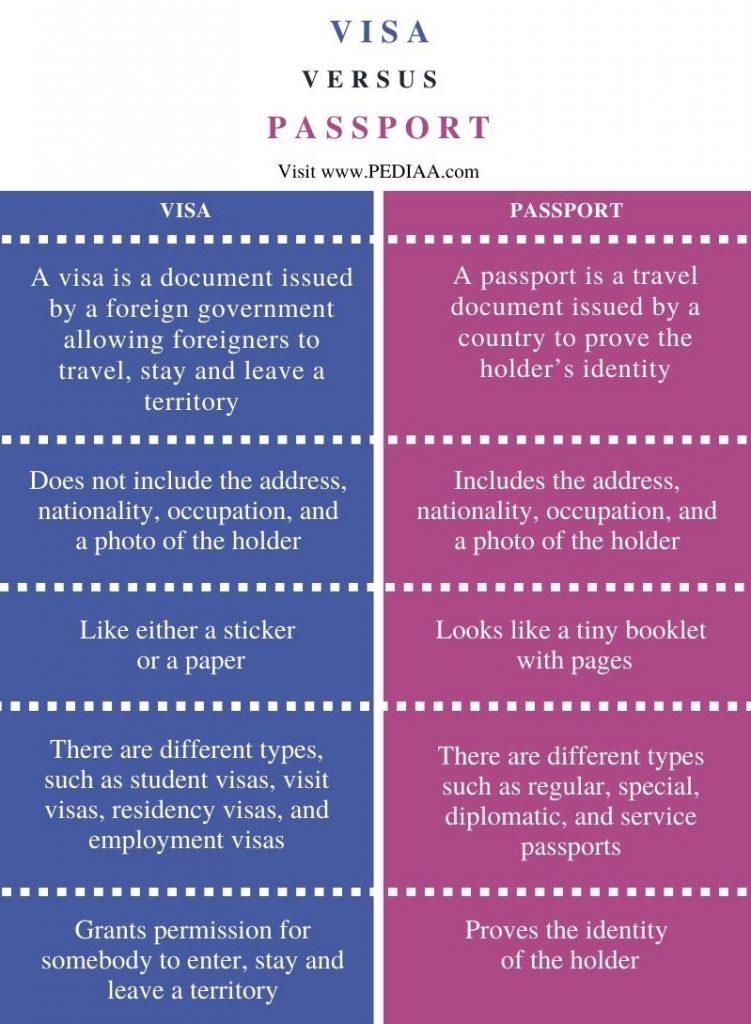Understanding The Visa Vs Passport Difference
When it comes to international travel, two terms often arise: visa and passport. While both are essential for crossing borders, they serve distinct purposes and are often confused by travelers. A passport is your primary identification document, allowing you to travel internationally, while a visa is a conditional permission granted by a foreign country for you to enter, stay, or leave their territory. Understanding the visa vs passport difference is crucial for anyone planning to venture beyond their own country's borders.
In essence, a passport verifies your identity and nationality, while a visa indicates the terms under which you may enter or stay in a foreign country. These documents are necessary for ensuring that travelers comply with the laws and regulations of the countries they wish to visit. Given the complexities of international travel, knowing the visa vs passport difference can save you time, money, and potential legal issues.
Additionally, the requirements for obtaining a visa and a passport can vary significantly from one country to another. Some nations have reciprocal agreements that allow citizens to travel without a visa, while others impose strict visa regulations. As you plan your next trip, being informed about the nuances of the visa vs passport difference will help you navigate the process smoothly and enjoy your travel experience.
- Titanic 2 Titanic 2 Titanic 2
- Taurus And Aries In Bed
- Iron Man As Doom
- Who Does Joey The Bachelor Choose
- Kelly And Kenny From Love Is Blind
What is a Passport?
A passport is an official government document that proves your identity and nationality. When traveling internationally, a passport is often the first document you need to present at border control. Below are some key features of a passport:
- It contains personal details such as your name, date of birth, and nationality.
- Passports typically have a validity period, which can vary by country.
- They serve as an identification document during international travel.
- Passports are required for re-entering your home country after travel.
What is a Visa?
A visa, on the other hand, is an endorsement or stamp that is placed in your passport, granting you permission to enter, stay, or leave a foreign country. The specifics can vary greatly depending on the country you are visiting. Here are some important aspects of a visa:
- Visas can be single-entry or multiple-entry, allowing for different types of travel.
- They may have specific time limits on how long you can stay in the country.
- Visas can require additional documentation, such as proof of accommodation or financial means.
- Some countries offer visa-on-arrival options, while others require a visa to be obtained in advance.
What is the Visa vs Passport Difference?
Understanding the visa vs passport difference is essential for travelers. The main distinction lies in their purpose and function: while a passport identifies you, a visa grants you permission to enter another country. Here’s a quick comparison:
- How Old Is Tom Brady
- When Did Ava Wood Die
- Who Sings The Song Hey What Going On
- Sabrina Carpenter Please Please Please
- Who Did Lady Gaga Date
| Aspect | Passport | Visa |
|---|---|---|
| Purpose | Identifies the traveler | Grants entry permission |
| Issuer | Government of your nationality | Government of the country you wish to enter |
| Validity | Varies by country, typically lasts for 5 to 10 years | Varies based on the type of visa issued |
| Requirement for Travel | Always required for international travel | May or may not be required, depending on the country |
Why Do You Need Both a Visa and a Passport?
Traveling internationally requires both a visa and a passport for various reasons:
- Passports are essential for identification at borders and for re-entry into your home country.
- Visas regulate the entry of foreign nationals and help countries manage immigration.
- Having both ensures compliance with international travel laws and regulations.
How to Obtain a Passport?
Obtaining a passport is a straightforward process, typically involving the following steps:
- Gather necessary documents, including proof of citizenship and identification.
- Complete the passport application form.
- Submit your application along with the required fee to the relevant government authority.
- Wait for processing, which can take anywhere from a few weeks to several months.
How to Obtain a Visa?
The process of obtaining a visa can vary significantly based on the country you are visiting and the type of visa you need. Common steps include:
- Determine the type of visa required for your travel purpose (tourism, business, etc.).
- Gather required documentation, including your passport, application forms, and supporting documents.
- Submit your application, often to an embassy or consulate, and pay any applicable fees.
- Attend an interview if required and wait for your visa to be processed.
What Happens if You Travel Without a Visa or Passport?
Traveling without a valid passport or visa can lead to serious consequences, including:
- Denial of entry into the destination country.
- Detention by immigration authorities.
- Fines and legal repercussions.
- Possible deportation and bans from future travel to that country.
Final Thoughts on the Visa vs Passport Difference
In summary, understanding the visa vs passport difference is crucial for successful international travel. A passport serves as your identification, while a visa grants you permission to enter a foreign country. By knowing what each document entails and the processes involved in obtaining them, you can prepare for your travels with confidence and ease. Always ensure that both your passport and any required visas are valid and up-to-date before embarking on your journey.
Article Recommendations
- Phil Collins Youll Be In My Heart
- Who Is Dating Meghan Trainor
- Who Won American Idol
- Taylor Swift And Boyfriend
- Good Lightweight Vacuum Cleaners



Detail Author:
- Name : Prof. Keaton Crooks IV
- Username : zbruen
- Email : kassulke.natalia@hotmail.com
- Birthdate : 1995-09-17
- Address : 275 Krajcik Lights Apt. 833 North Jackson, OK 76575-9427
- Phone : 504.686.5759
- Company : Boehm Ltd
- Job : Real Estate Association Manager
- Bio : Assumenda deleniti aut commodi fugiat sit delectus. Asperiores pariatur ab cumque qui voluptatem. Blanditiis temporibus voluptas aut voluptatem quo nesciunt.
Socials
facebook:
- url : https://facebook.com/chanel7143
- username : chanel7143
- bio : Adipisci provident eligendi animi quia maiores laudantium porro eaque.
- followers : 6919
- following : 2258
linkedin:
- url : https://linkedin.com/in/chanel9410
- username : chanel9410
- bio : Aspernatur repellat sapiente incidunt corrupti.
- followers : 6991
- following : 1239
tiktok:
- url : https://tiktok.com/@chanelhilpert
- username : chanelhilpert
- bio : Rem beatae vero et. Est animi facilis autem maiores repudiandae itaque non.
- followers : 3061
- following : 1367
twitter:
- url : https://twitter.com/chanel_hilpert
- username : chanel_hilpert
- bio : Molestias expedita et voluptas quo amet veniam iusto. Voluptatibus voluptatem quis consequuntur quos doloribus atque ea. Id dignissimos minima accusamus.
- followers : 6043
- following : 2563